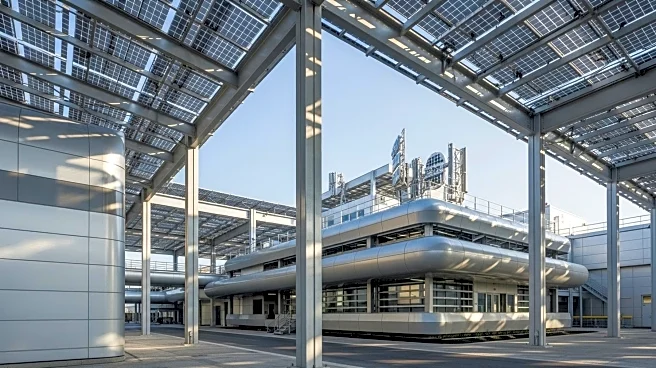What is the story about?
What's Happening?
Viva Energy has inaugurated a new fuel and lubricants facility in Karratha, Australia, aimed at improving the efficiency of lubricant delivery and reducing carbon emissions. The facility, which represents an investment of over A$25 million, is designed to support regional mining, oil and gas, construction, and other industrial sectors. By storing more than 2.4 million liters of lubricant shipped directly from Singapore to Dampier, the facility eliminates the need for a previous longer route that involved over 1,000 km of sea and 1,500 km of road transportation. This new route is expected to cut more than 450,000 km of annual road freight, significantly reducing transport emissions.
Why It's Important?
The opening of this facility is significant as it aligns with Viva Energy's commitment to operational efficiency and sustainability. By shortening the supply chain, the company not only enhances its logistics operations but also reduces its environmental footprint. This move is particularly important for the Pilbara region, a critical area for mining and industrial activities, as it ensures a more reliable and efficient supply of lubricants. The reduction in transportation distances also reflects a broader industry trend towards sustainability and reduced carbon emissions, which is increasingly becoming a priority for businesses and their customers.
What's Next?
Viva Energy's initiative is expected to set a precedent for other companies in the industry to follow suit in enhancing supply chain efficiency and reducing emissions. The company will continue to focus on sustainability, as evidenced by its participation in the upcoming International Mining and Resources Conference + Expo (IMARC) 2025, where discussions on renewable diesel supply and circularity in business practices will take place. This could lead to further innovations and investments in sustainable practices within the industry.
Beyond the Headlines
The establishment of the Karratha facility highlights the growing importance of integrating sustainability into business operations. It underscores the potential for significant environmental benefits when companies prioritize efficient logistics and reduced emissions. This development may also influence regulatory policies and encourage more companies to adopt similar practices, contributing to broader environmental goals.















